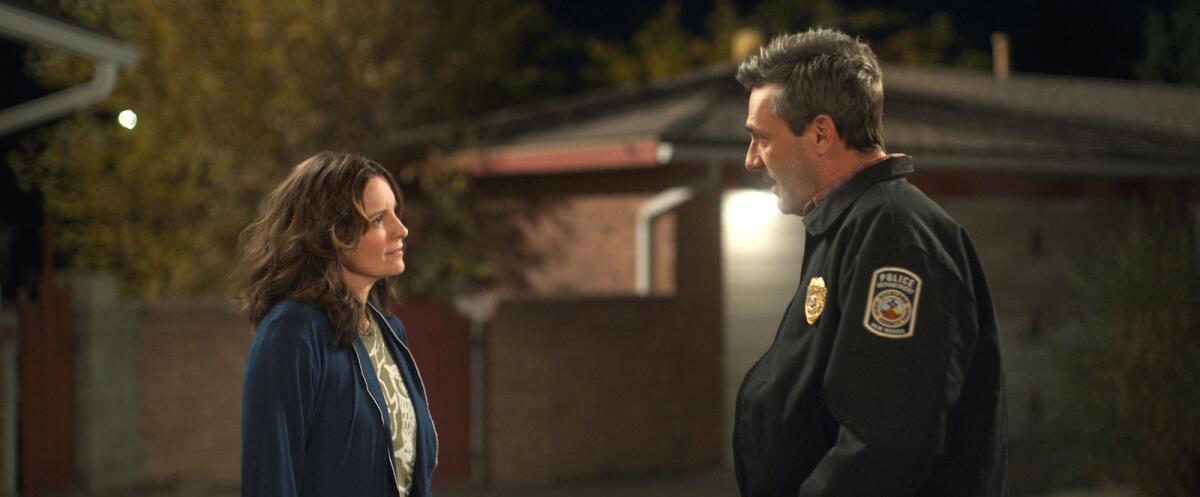Review: Jon Hamm and Tina Fey bring what little spark there is to ‘Maggie Moore(s)’

‘Maggie Moore(s)’
The number of famous names in the credits for the blackly comic murder mystery “Maggie Moore(s)” is way out of proportion for how minor the movie is — although without them, the picture might dissipate completely. Directed by John Slattery from a screenplay by veteran writer Paul Bernbaum, “Maggie Moore(s)” stars Jon Hamm as widowed police chief Jordan Sanders, who alongside his snarky deputy Reddy (played by Nick Mohammed from “Ted Lasso”) tries to figure out why two women named Maggie Moore have been killed in his small Arizona town in the same week. While investigating the crimes, Chief Sanders becomes friendly with one of the Maggies’ neighbors, Rita (Tina Fey), who rekindles his dormant interest in romance.
Jordan and Rita’s flirty dynamic brings some much-needed casual charm to “Maggie Moore(s),” even though Hamm and Fey don’t have a lot to work with here. Hamm’s character is one-dimensional: the affable lawman stubbornly resistant to change. Fey’s Rita barely has any dimension at all. The only thing we really know about her is that she occasionally has sex with her ex, which gives Jordan a puritanical excuse to avoid dating her. And yet these two are still likable together, trading witty asides and hungry looks.
Where “Maggie Moore(s)” really falls short is in its main plot, a wan derivative of “Fargo” — both the movie and the TV series. The Moore murders involve a variety of overwrought cartoonish characters, including: a hulking hitman named Kosco (Happy Anderson), who intimidates people through stony silence; Maggie No. 1’s husband, Jay (Micah Stock), a sleazy sandwich shop owner; and Maggie No. 2’s husband, Andy (Christopher Denham), a poor schmo who gets framed as a suspect through Jay’s twisted logic that multiple corpses with the same name will confuse the cops.
As in “Fargo,” the investigation reveals how layers of darkness and need can lurk just below the surface of a sleepy community. But because the killers and victims are all somewhat silly, that point is blunted. “Maggie Moore(s)” is easy to watch, because the actors are talented and the tone is light — even when the plot ranges into subjects like sex work and child pornography. But nothing in the story really sticks, or stings. The ace cast makes the movie better. But they deserved a better movie.
‘Maggie Moore(s).’ R, for language throughout, violence, some sexual material, brief nudity and drug use. 1 hour, 39 minutes. Available on VOD; also playing theatrically, Laemmle Monica Film Center, Santa Monica

‘Seire’
According to the opening credits, the title of the Korean psychodrama “Seire” refers to a 21-day period after a baby is born, when the family tries to remain isolated — avoiding any potential evil spirits that may corrupt the child. This quarantine doesn’t come easy to Woo-jin (Seo Hyun-woo), a new father who’s not especially superstitious and feels ambivalent about parenting in the first place. When his wife, Hae-mi (Sim Eun-woo), forbids Woo-jin to attend the funeral of one of his ex-girlfriends, he secretly goes anyway. Before long, his domestic bliss begins to sour, and he can’t be sure whether what he’s experiencing — a sickly child, rotten fruit, violent impulses — is some kind of a curse, or just a normal part of being a sleep-deprived, stressed-out dad.
“Seire” writer-director Park Kang keeps open the question of whether Woo-jin’s problems are natural or supernatural, because it’s not really relevant to the story he’s telling. The ambiguity saps the film of some spooky energy, but it keeps alive the idea that “Seire” is really about a universal experience for new parents, once it begins to sink in that their path in life has narrowed. Woo-jin’s nightmares — if that’s what they are — lead him to reflect on his past, and to recall the choices that led him to where he is now. What results is a down-to-earth kind of horror movie, about the common feelings of despair fathers feel during those draining first few weeks.
‘Seire.’ In Korean with subtitles. Not rated. 1 hour, 41 minutes. Available on VOD
Amid a writers’ strike largely about the power of platforms, we take a snapshot of the streaming pecking order, from Netflix to (formerly HBO) Max.
‘Jagged Mind’
Adapted and expanded from screenwriter Allyson Morgan’s short film “First Date,” the edgy thriller “Jagged Mind” takes an original approach to the time-loop concept, using it as a metaphor for the way an abusive person gaslights her partner. Maisie Richardson-Sellers plays Billie, who is mostly deliriously happy with her new girlfriend, Alex (Shannon Woodward), except for those times when Billie experiences such powerful feelings of deja vu that she blacks out — usually after having what could be either a daydream or a memory of Alex screaming at her.
Morgan and director Kelley Kali (taking over for the short’s director, Meredith Alloway) don’t play coy with the audience about what’s actually happening. It’s clear early on that Alex is manipulating reality by pressing a kind of cosmic reset button every time her anger and violence goes too far and drives Billie away. And while the filmmakers struggle to flesh this out into an entire feature — with a longer-than-necessary setup and some uninspired cat-and-mouse suspense moves at the climax — it’s hard to shake off the central idea. Even without its paranormal elements, “Jagged Mind” is a powerful portrait of the dissociation that occurs when a person tries to justify the misbehavior of someone they love.
‘Jagged Mind.’ TV-MA for language, sex, violence. 1 hour, 28 minutes. Available on Hulu
Also on VOD
“Midday Black Midnight Blue” is a study of devastating grief, starring Samantha Soule as Liv, a woman whose death over a decade ago still haunts Ian (Chris Stack), the man who loved her but couldn’t get along with her. Merritt Wever plays Liv’s sister Beth in an impressionistic film — co-written and co-directed by Soule and Daniel Talbott — that jumps freely between the past and the present, crafting a collage of regrets.
More to Read
Only good movies
Get the Indie Focus newsletter, Mark Olsen's weekly guide to the world of cinema.
You may occasionally receive promotional content from the Los Angeles Times.











